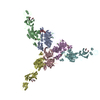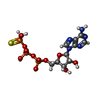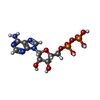[English] 日本語
 Yorodumi
Yorodumi- PDB-7l6n: The Mycobacterium tuberculosis ClpB disaggregase hexamer structur... -
+ Open data
Open data
- Basic information
Basic information
| Entry | Database: PDB / ID: 7l6n | ||||||
|---|---|---|---|---|---|---|---|
| Title | The Mycobacterium tuberculosis ClpB disaggregase hexamer structure with three locally refined ClpB middle domains and three DnaK nucleotide binding domains | ||||||
 Components Components |
| ||||||
 Keywords Keywords |  CHAPERONE / ClpB-DnaK complex / CHAPERONE / ClpB-DnaK complex /  protein aggregates / Unfold / Refold protein aggregates / Unfold / Refold | ||||||
| Function / homology |  Function and homology information Function and homology informationATP-dependent protein folding chaperone / unfolded protein binding / response to heat / protein refolding /  hydrolase activity / hydrolase activity /  ATP hydrolysis activity / ATP hydrolysis activity /  ATP binding / ATP binding /  cytoplasm cytoplasmSimilarity search - Function | ||||||
| Biological species |   Mycobacterium tuberculosis (bacteria) Mycobacterium tuberculosis (bacteria) | ||||||
| Method |  ELECTRON MICROSCOPY / ELECTRON MICROSCOPY /  single particle reconstruction / Resolution: 7 Å single particle reconstruction / Resolution: 7 Å | ||||||
 Authors Authors | Yin, Y.Y. / Feng, X. / Li, H. | ||||||
| Funding support |  United States, 1items United States, 1items
| ||||||
 Citation Citation |  Journal: Cell Rep / Year: 2021 Journal: Cell Rep / Year: 2021Title: Structural basis for aggregate dissolution and refolding by the Mycobacterium tuberculosis ClpB-DnaK bi-chaperone system. Authors: Yanting Yin / Xiang Feng / Hongjun Yu / Allison Fay / Amanda Kovach / Michael S Glickman / Huilin Li /  Abstract: The M. tuberculosis (Mtb) ClpB is a protein disaggregase that helps to rejuvenate the bacterial cell. DnaK is a protein foldase that can function alone, but it can also bind to the ClpB hexamer to ...The M. tuberculosis (Mtb) ClpB is a protein disaggregase that helps to rejuvenate the bacterial cell. DnaK is a protein foldase that can function alone, but it can also bind to the ClpB hexamer to physically couple protein disaggregation with protein refolding, although the molecular mechanism is not well understood. Here, we report the cryo-EM analysis of the Mtb ClpB-DnaK bi-chaperone in the presence of ATPγS and a protein substrate. We observe three ClpB conformations in the presence of DnaK, identify a conserved TGIP loop linking the oligonucleotide/oligosaccharide-binding domain and the nucleotide-binding domain that is important for ClpB function, derive the interface between the regulatory middle domain of the ClpB and the DnaK nucleotide-binding domain, and find that DnaK binding stabilizes, but does not bend or tilt, the ClpB middle domain. We propose a model for the synergistic actions of aggregate dissolution and refolding by the Mtb ClpB-DnaK bi-chaperone system. | ||||||
| History |
|
- Structure visualization
Structure visualization
| Movie |
 Movie viewer Movie viewer |
|---|---|
| Structure viewer | Molecule:  Molmil Molmil Jmol/JSmol Jmol/JSmol |
- Downloads & links
Downloads & links
- Download
Download
| PDBx/mmCIF format |  7l6n.cif.gz 7l6n.cif.gz | 831.1 KB | Display |  PDBx/mmCIF format PDBx/mmCIF format |
|---|---|---|---|---|
| PDB format |  pdb7l6n.ent.gz pdb7l6n.ent.gz | 676.2 KB | Display |  PDB format PDB format |
| PDBx/mmJSON format |  7l6n.json.gz 7l6n.json.gz | Tree view |  PDBx/mmJSON format PDBx/mmJSON format | |
| Others |  Other downloads Other downloads |
-Validation report
| Arichive directory |  https://data.pdbj.org/pub/pdb/validation_reports/l6/7l6n https://data.pdbj.org/pub/pdb/validation_reports/l6/7l6n ftp://data.pdbj.org/pub/pdb/validation_reports/l6/7l6n ftp://data.pdbj.org/pub/pdb/validation_reports/l6/7l6n | HTTPS FTP |
|---|
-Related structure data
| Related structure data |  23206MC  6w6eC  6w6gC  6w6hC  6w6iC  6w6jC C: citing same article ( M: map data used to model this data |
|---|---|
| Similar structure data |
- Links
Links
- Assembly
Assembly
| Deposited unit | 
|
|---|---|
| 1 |
|
- Components
Components
| #1: Protein |  Mass: 92688.281 Da / Num. of mol.: 6 Source method: isolated from a genetically manipulated source Source: (gene. exp.)   Mycobacterium tuberculosis (bacteria) / Gene: clpB, MT0397 / Production host: Mycobacterium tuberculosis (bacteria) / Gene: clpB, MT0397 / Production host:   Escherichia coli (E. coli) / References: UniProt: P9WPD0 Escherichia coli (E. coli) / References: UniProt: P9WPD0#2: Protein/peptide | | Mass: 2826.475 Da / Num. of mol.: 1 Source method: isolated from a genetically manipulated source Source: (gene. exp.)   Mycobacterium tuberculosis (bacteria) / Production host: Mycobacterium tuberculosis (bacteria) / Production host:   Escherichia coli (E. coli) Escherichia coli (E. coli)#3: Protein |  / HSP70 / Heat shock 70 kDa protein / Heat shock protein 70 / HSP70 / Heat shock 70 kDa protein / Heat shock protein 70Mass: 66910.680 Da / Num. of mol.: 3 Source method: isolated from a genetically manipulated source Source: (gene. exp.)   Mycobacterium tuberculosis (bacteria) Mycobacterium tuberculosis (bacteria)Gene: dnaK_2, dnaK, E5M05_19850, ERS007703_00955, ERS023446_02581, ERS027651_01905, FCN16_12395, SAMEA2682864_01182, SAMEA2683035_02658 Production host:   Escherichia coli (E. coli) / References: UniProt: A0A045JRR0 Escherichia coli (E. coli) / References: UniProt: A0A045JRR0#4: Chemical | ChemComp-AGS / #5: Chemical |  Adenosine diphosphate Adenosine diphosphateHas ligand of interest | Y | |
|---|
-Experimental details
-Experiment
| Experiment | Method:  ELECTRON MICROSCOPY ELECTRON MICROSCOPY |
|---|---|
| EM experiment | Aggregation state: PARTICLE / 3D reconstruction method:  single particle reconstruction single particle reconstruction |
- Sample preparation
Sample preparation
| Component | Name: ClpB/DnaK complex / Type: COMPLEX / Entity ID: #1-#3 / Source: RECOMBINANT |
|---|---|
| Source (natural) | Organism:   Mycobacterium tuberculosis (bacteria) Mycobacterium tuberculosis (bacteria) |
| Source (recombinant) | Organism:   Escherichia coli (E. coli) Escherichia coli (E. coli) |
| Buffer solution | pH: 8 |
| Specimen | Embedding applied: NO / Shadowing applied: NO / Staining applied : NO / Vitrification applied : NO / Vitrification applied : NO : NO |
- Electron microscopy imaging
Electron microscopy imaging
| Experimental equipment |  Model: Titan Krios / Image courtesy: FEI Company |
|---|---|
| Microscopy | Model: FEI TITAN KRIOS |
| Electron gun | Electron source : :  FIELD EMISSION GUN / Accelerating voltage: 300 kV / Illumination mode: FLOOD BEAM FIELD EMISSION GUN / Accelerating voltage: 300 kV / Illumination mode: FLOOD BEAM |
| Electron lens | Mode: DIFFRACTION |
| Image recording | Electron dose: 2 e/Å2 / Film or detector model: GATAN K2 SUMMIT (4k x 4k) |
- Processing
Processing
CTF correction | Type: NONE |
|---|---|
3D reconstruction | Resolution: 7 Å / Resolution method: OTHER / Num. of particles: 45000 Details: Phenix.combine_focused_maps was used to generate the composite map from several local refined maps. The reported resolution is the worst resolution in the local maps. Symmetry type: POINT |
 Movie
Movie Controller
Controller












 PDBj
PDBj







